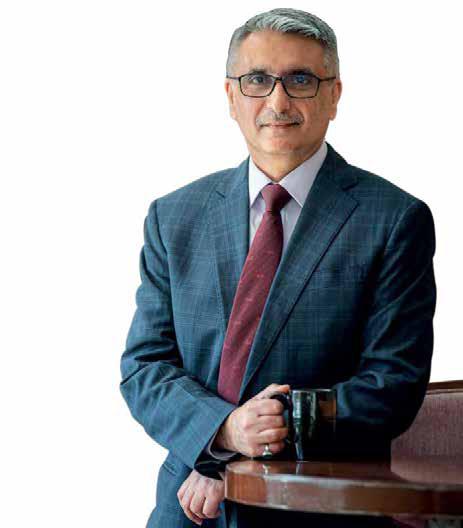Prøve GULL - Gratis
'Basic limitation of BVoc was its name'
Careers 360
|March 2025
Established in 2013 at Tarsali in Gujarat’s Vadodara district, TeamLease Skills University is India’s first vocational education and training university. It was the result of a public-private partnership between the Gujarat government and Bengaluru-based recruitment agency, TeamLease Services. In this interaction with Musab Qazi, TeamLease’s chief strategy officer Sumit Kumar speaks about the university’s unique approach, regulatory limitations and the future of skilling in the country. Edited excerpts:

Q. Where did the idea of a skills university come from and how has it fared so far?
A. Our aim was to create more employable people and bridge the skill gap. Being in the employment business, we realised that the world of work was transforming and that there was a disconnect between education and employment. We explored a community college concept where we could mobilise students locally and get more industry-linked programmes. We were registered as a state private university in 2013. While we focus on the local population, students from outside Gujarat have also enrolled at the university.
In 2022, we were accredited by the National Assessment and Accreditation Council (NAAC) - we are the only skills university to be assessed so far.
Q. How many students are enrolled?
A. While there are around 400 students for campus programmes, we have also been working on industry projects, where organisations re-skill their existing workforce. TeamLease also runs an apprenticeship programme and was involved with the National Employability Enhancement Mission (NEEM). In fact, we were the first university to prepare an industry apprenticeship programme under the Apprenticeship Embedded Degree Programme (AEDP) guidelines, in collaboration with Electronics Sector Skills Council Of India and Automotive Skills Development Council.
Q. What proportion of curriculum consist of on the job training?
A. Every semester, students go through an industry course, with 30% time spent in industries we have local tie-ups with.
Q. How many courses do you have? How do you choose which to offer?
A. We have a flagship BSc Mechatronics programme, in addition to BCom, DMLT and hospitality-related courses. We chose regular nomenclature for the courses, instead of BVoc, to have a wider appeal. The programmes were designed keeping in mind the needs of the industry.
Denne historien er fra March 2025-utgaven av Careers 360.
Abonner på Magzter GOLD for å få tilgang til tusenvis av kuraterte premiumhistorier og over 9000 magasiner og aviser.
Allerede abonnent? Logg på
FLERE HISTORIER FRA Careers 360

Careers 360
A Life Lived on Her Own Terms
A tribute to Armaity Desai - teacher, mentor, changemaker, and a life well lived
7 mins
November 2025

Careers 360
'Tech has automated tasks, not trust'
Management education in India is undergoing a steady transformation. Classrooms that once focused mainly on lectures and case studies are now becoming spaces for experimentation, digital learning, and skill building. Himadri Das, director general of International Management Institute (IMI), in an email interaction with Pritha Roy Choudhury, explains how business schools are preparing students for an AI-driven world, why emotional intelligence is more important than ever, and what future-ready management education truly means. Edited excerpts:
3 mins
November 2025

Careers 360
'B-schools' applied knowledge creation must get due credit in rankings'
Great Lakes Institute of Management, Chennai, has updated its one-year PGPM and the two-year programme has seen applications nearly double in four years. Chief operating officer, Gautam Lakhamraju explains how Great Lakes has “moved management education from being content-heavy to context-driven\", the latest trends in placements and what NIRF needs to change for a fairer assessment of standalone B-schools, in an email exchange with Aeshwarya Tiwari. Edited excerpts:
6 mins
November 2025
Careers 360
ICAR PhD stipend to be hiked
The Indian Council of Agricultural Research (ICAR) has decided to hike the institute fellowship for PhD students at its four agriculture deemed universities and make it uniform across the institutes.
1 min
November 2025

Careers 360
Incubation centres, govt schemes boost student entrepreneurship
While student startups struggle with funding, B-school incubators and government schemes are helping get ideas off the ground with both seed-funding and mentorship
4 mins
November 2025

Careers 360
Learning leadership
Management programmes are increasingly leaning toward creating leaders, rather than just managers
2 mins
November 2025

Careers 360
India's original data science institute faces crisis
ISI Kolkata community is seeking intervention of MPs, West Bengal government and academics to stop systemic 'dismantling'; 1,800 sign petition to MoSPI
6 mins
November 2025
Careers 360
New tech programmes
Indian Institute of Technology (IIT) Gandhinagar has launched three different six-month fully-residential tech postgraduate diploma programmes.
1 min
November 2025

Careers 360
'AI literacy: Key differentiator for MBA graduates'
Management education must now venture into emerging areas like agriculture and agri-tech, especially in the context of climate change and sustainability, said professor Ajit Parulekar, director of the Goa Institute of Management, during an interview with Shradha Chettri. He also highlighted how proficiency in AI and related technological tools has become a universal expectation from recruiters. Edited excerpts from the conversation:
5 mins
November 2025

Careers 360
Why B-school salaries hit a standstill
After years of steady growth, India's top B-schools – including IIMs – face stagnant, falling median salaries as AI layoffs, cautious hiring, and market slowdown reshape campus recruitment
5 mins
November 2025
Listen
Translate
Change font size

